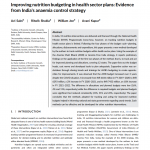
Corruption as a wicked problem?
17 February 2011
The Indian polity is increasingly being exposed to corruption and other breaches of accountability. As Yamini had pointed out in an earlier blog, there is an increased public clamour for institutional reform, public accountability and reduction of corruption.
In this blog post, I argue that corruption as well as ensuring accountability in an organization and a nation, are “wicked problems” and the first step to solving a “wicked problem” is to recognize its “wickedness” and use the corresponding problem-solving techniques. Not recognizing this fact would lead to inefficient solutions at the best, and counterproductive solutions at the worst.
At this point let me clarify what I mean by wicked. I am not using it in the sense of being evil, but rather as a problem which is very resistant to solution. This terminology was originally proposed by H. W. J. Rittel and M. M. Webber, both urban planners at the University of California, Berkeley, USA in 1973.
In a landmark article, the authors observed that there is a whole realm of social planning problems that cannot be successfully treated with traditional linear, analytical approaches. They called these issues wicked problems and contrasted them with ‘tame’ problems. Tame problems are not necessarily simple—they can be very technically complex—but the problem can be tightly defined and a solution fairly readily identified or worked through.
Some of the famous problems identified as wicked problems over the years are “Climate change”, “Obesity etc”. I will explain how corruption also shows almost all the characteristics of wicked problems.
Wicked problems are difficult to clearly define – The nature and extent of problem depends on who has been asked. In the case of corruption and accountability, this paper talks about the great definition debate of corruption. The author has talked about various failed attempt at developing a universal definition of corruption. For example, there’s been a raging debate between public-office, market- and public-interest-centered definitions.
Wicked problems are often not stable : In the case of corruption, in addition to being subject to unclear definitions, the definition of corruption has also evolved over time. For example, what might be considered perfectly acceptable behavior today may be considered corrupt tomorrow. The earlier corruption-academicians like Leff 1964, Bayley 1966 etc considered corruption to be a necessary part of adjustment for developing democracies. Leff even argued that corruption could be promote efficiency. This view of corruption was challenged by a new generation of scholars such as Anne Krueger and Susan-Rose-Ackerman who recast corruption as an individual choice.
Some wicked problems are characterised by chronic policy failure – Corruption as a problem has been around since time immemorial. The Arthashastra talks about it, the Roman & Greek empires talk about it. In fact, corruption was enough of a problem in the Athenian democracy that an investigatory institution, the Council of Areopagus, had as one of its duties the reporting of corrupt behavior. However, it still remains as burning an issue now, as it was before
Wicked problems have many interdependencies and often multi-causal – There are also internally conflicting goals or objectives within the broader wicked problem. For example, some scholars have viewed corruption as oiling the wheels of democracy and thus found reducing it detrimental to a nation, while others have viewed corruption as grit in the wheels of an organization.
Wicked problems usually have no clear solution : There is no magic bullet solution which has come out of all the research on corruption. In India itself, computerization of records has helped in reducing corruption in some places, while in others people have found ways to circumvent it. In some places, 0 Rs notes have been able to shame corrupt officials into not taking bribes, while in others it is laughed away. In some places, social audits have helped in reducing corruption, while in others it has been subject to a lot of political pressure.
Wicked problems hardly ever sit conveniently within the responsibility of any one organisation : For example, if we have to reduce corruption in the PDS system, it would involve the local governments at all levels, the fair price shops, the consumers etc. Wicked problems are thus socially complex
Wicked problems involve changing behaviour : Corruption involves changing the behavior of some if not all citizens of a country or the world. It involves a behavioral change in the bribe-giver and the receiver. It involves a change in the politician who grants favors and the citizens who asks for it. It involves a change in the cousin who uses his relatives influence to get things done, and also involves change in the relatives behavior who does not condone such behavior.
Attempts to address wicked problems often lead to unforeseen consequences : I couldn’t find any papers to substantiate this as yet.
Now that it seems that corruption is a wicked problem, what next? Are there any processes developed for tackling wicked problems. Unfortunately no. Wicked problems is a developing field (it started in the 1970’s) and tackling them is an evolving art. Most solutions involve a collaborative approach and so the focus has been to develop mechanisms which would foster collaborative and fruitful dialogue. Other authoritative and competitive approaches have also been advocated, but most literature on wicked problems advocate a collaborative approach.
My next blog post would talk about how our current way of formulating public policy is not the best way to solve wicked problems and how Accountability Initiative of monitoring and responding may be a better way to develop policy. I will also in a later blog post talk about how technology can be used to facilitate solving the wicked problem of corruption





